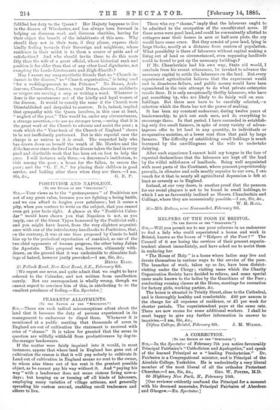PEASANTS' ALLOTMENTS.
To THE EDITOR OF THE " SPECTATOR."1
SIR,—There are such radical misconceptions afloat about the land that it becomes the duty of persons experienced in its management to endeavour to dispel them. Whenever it is mentioned at a public meeting that thousands of acres in England are out of cultivation the statement is received with cries of " shame." It is taken for granted that the areas in question are wilfully withheld from productiveness by dog-inthe-manger landowners.
If the matter were fairly inqnired into it would, in most instances, appear that where land in England has gone out of cultivation the reason is that it will pay nobody to cultivate it. Land out of cultivation in England means no rent to the owner, to whom nine times out of ten rent is the greatest possible object, as be cannot pay his way without it. And "paying his way" with a landowner does not mean riotous living now-a-. days ; but keeping on or turning off all kinds of labourers, employing many varieties of village artisans, and generally spreading his custom around, enabling small tradesmen and others to live.
Those who cry " shame," imply that the labourers ought to be admitted to the occupation of the uncultivated acres. If these acres were good land, and could he conveniently allotted to cottagers near their homes in acre or half-acre plots, the cry would have some sense. But they consist of poor land, lying in large blocks, mostly at a distance from centres of population. What possibility is there of labourers without capital making a living out of land so circumstanced, even supposing landlords could be found to put up the necessary buildings?
If Mr. Chamberlain had his own way, State aid would, I conclude from his recent utterances, be invoked to advance the necessary capital to settle the labourers on the land. But every experienced agriculturist believes that the experiment would end in disastrous failure, and public money would have been squandered in the vain attempt to do what private enterprise recoils from. It is only exceptionally thrifty labourers, who have put something by, who are likely to do fairly well on sma holdings. But these men have to be carefully selected,—a selection which the State has not the power of making.
It has been my constant endeavour, during twelve years of
landownership, to pick out such men, and do everything to• encourage them. In that period, I have succeeded in establishing only five small farmers, in spite of every variety of advantageous offer to let land in any quantity, to individuals or co-operative societies, at a lower rent than that paid by large farmers. The difficulty of establishing small holdings is much increased by the unwillingness of the wife to undertake dairying.
After such experience I cannot hold my tongue in the face of repeated declarations that the labourers are kept off the land by the wilful selfishness of landlords. Being well acquainted with most parts of the Continent, where peasant-proprietorship prevails, in climates and soils mostly superior to our own, I can vouch for it that in nearly all agricultural depression is felt at least as severely as in England.
Ireland, at our very doors, is another proof that the panacea for our social plagues is not to be found in small holdings, to which I am as favourably inclined as Messrs. Chamberlain and Collings, where they are economically possible.—I am, Sir, dtc.,
W. H. HALL.
Six-Mile Bottom, near Newmarket, February 9th.


































 Previous page
Previous page